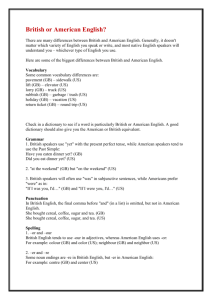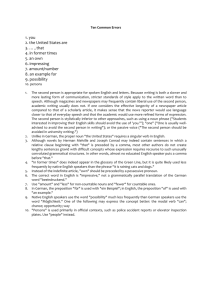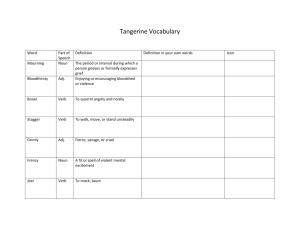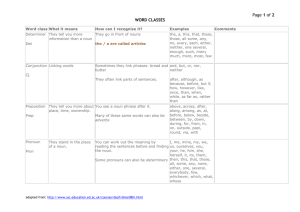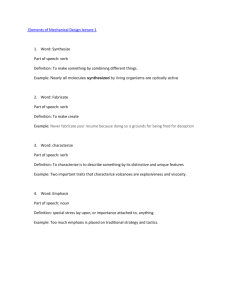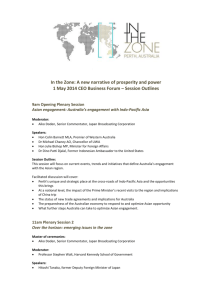Jaehoon Jung ESL15 Journal 1
advertisement
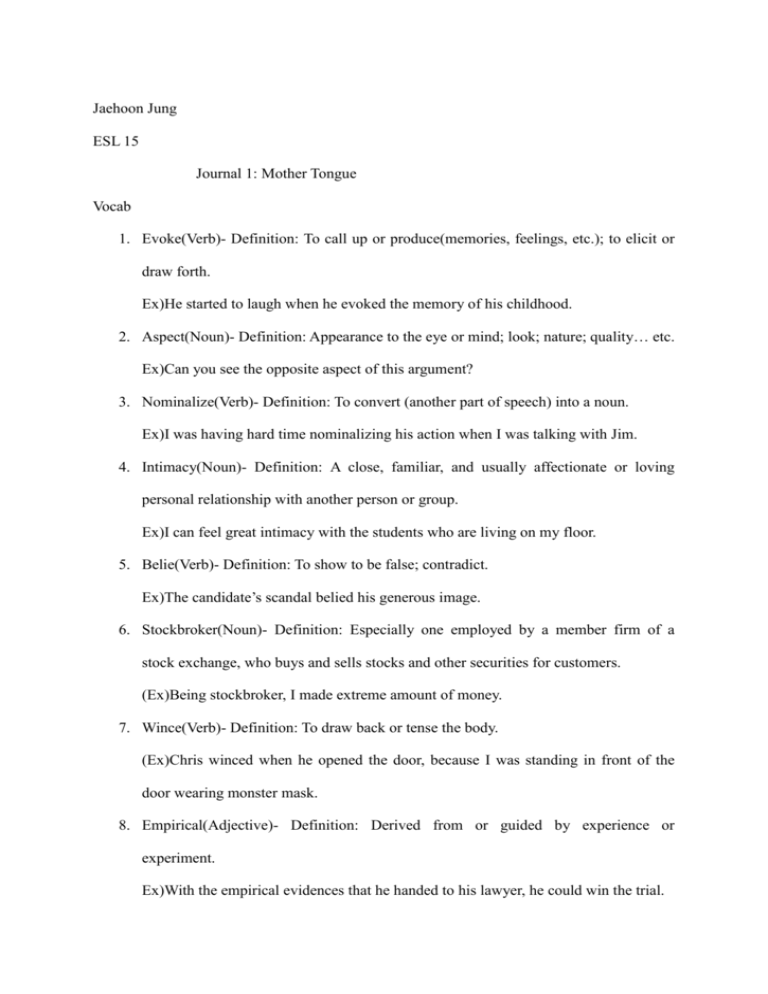
Jaehoon Jung ESL 15 Journal 1: Mother Tongue Vocab 1. Evoke(Verb)- Definition: To call up or produce(memories, feelings, etc.); to elicit or draw forth. Ex)He started to laugh when he evoked the memory of his childhood. 2. Aspect(Noun)- Definition: Appearance to the eye or mind; look; nature; quality… etc. Ex)Can you see the opposite aspect of this argument? 3. Nominalize(Verb)- Definition: To convert (another part of speech) into a noun. Ex)I was having hard time nominalizing his action when I was talking with Jim. 4. Intimacy(Noun)- Definition: A close, familiar, and usually affectionate or loving personal relationship with another person or group. Ex)I can feel great intimacy with the students who are living on my floor. 5. Belie(Verb)- Definition: To show to be false; contradict. Ex)The candidate’s scandal belied his generous image. 6. Stockbroker(Noun)- Definition: Especially one employed by a member firm of a stock exchange, who buys and sells stocks and other securities for customers. (Ex)Being stockbroker, I made extreme amount of money. 7. Wince(Verb)- Definition: To draw back or tense the body. (Ex)Chris winced when he opened the door, because I was standing in front of the door wearing monster mask. 8. Empirical(Adjective)- Definition: Derived from or guided by experience or experiment. Ex)With the empirical evidences that he handed to his lawyer, he could win the trial. Like for authors mother, English is also a second language for me. I could strongly sympathy with author’s story and agree with author’s idea in the story, because the things that her mother had to endure was the things that I had to endure when I first went Australia to study English. I started learning English in Australia when I was in 3rd grade. Back then, my English skill was very bad, I could barely speak, could not unerstand English well and when I write, many people could not understand what I wrote, because my grammer was very bad. I wanted to joke around with my Australian friends in English, but I could not joke around with them as much as I wanted, also they had to repeat for me what they said in a easier way so that I can understand them. Unlike author’s mother, I wasn’t looked down because of my English skills, but I was outsider in their society even my Australian friends treated me well and were nice to me. The only way to do it was study English so I can communicate better with them and to express me better. As I studied English and hang around a lot with my Australian friends, my English started to get improved; I was on the school newspaper for several times for excellent academic performaces. Then I started to enjoy my school more and I could permeate into their society better than before. With my hard effort, I could achieve some of my goals that I set when I start learning English. Like I did in Australia, many people who are speaking English as a second language put a lot of efforts into studying English. Even they put that much of effort in to English, learning a foreign language takes a long time, so they will speak broken English for a while, but native English speakers always have to remember that we put a lot of effort to learn Englsih, and not look down on foreign people who are speaking broken English. Native English speakers should admire and respect foreign people’s effort to learn English and instead of looking down on them they should help them so they can improve English in much faster time. Now I am attending American University, majoring in International Politics, even my English has improved a lot, still it requires me hard working, especially in writing. When I have writing assignments to do, I get a lot of helps from professors, from writing center and from my American friends. When I ask them for the help, they never refuse or look down on me because my writing is not good as theirs, and these attitudes of them encourages me a lot and makes me to write better in English, also this process really improves my English even further. With my experiences in Australia and my current University, I strongly agree with author’s idea that native English speakers should not look down on foreign people who speakes English as a second language. Native speakers should admire them and help them improving their English in a shorter time. Question: What is your feeling when you see foreign people who speaks broken English?
